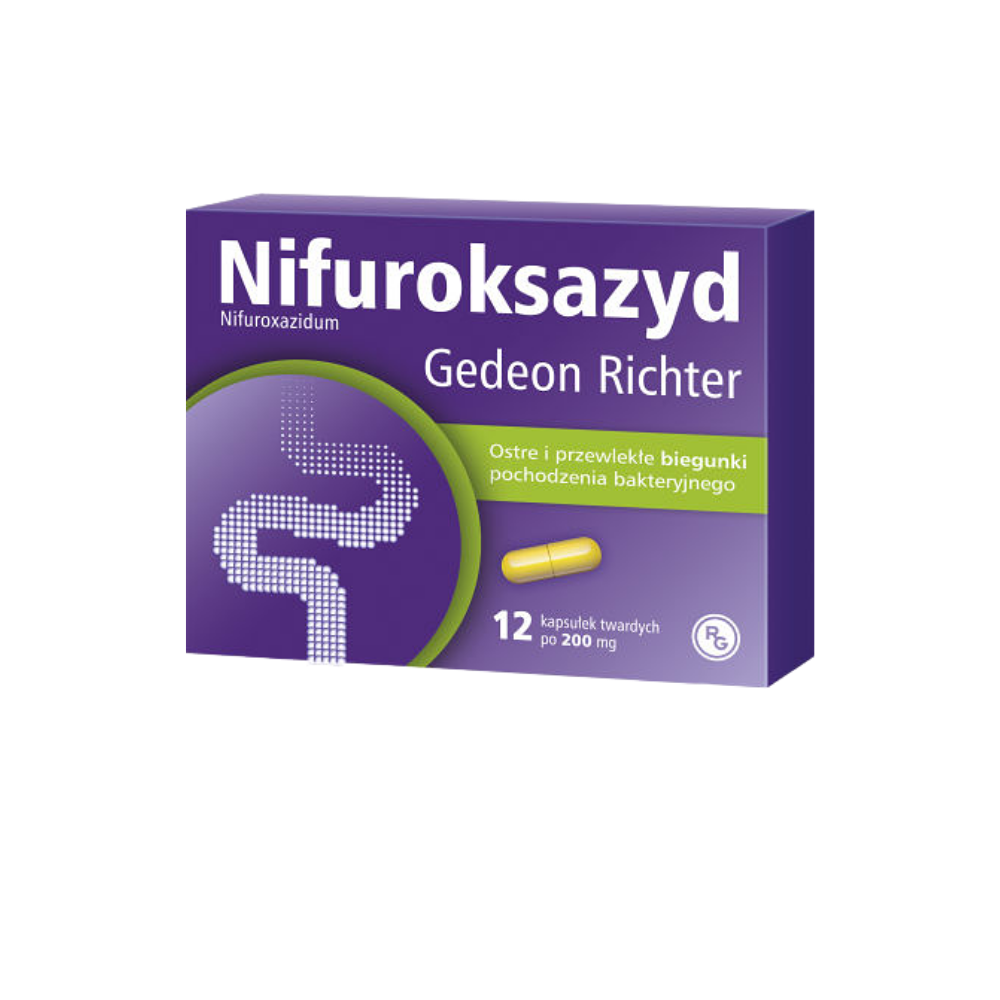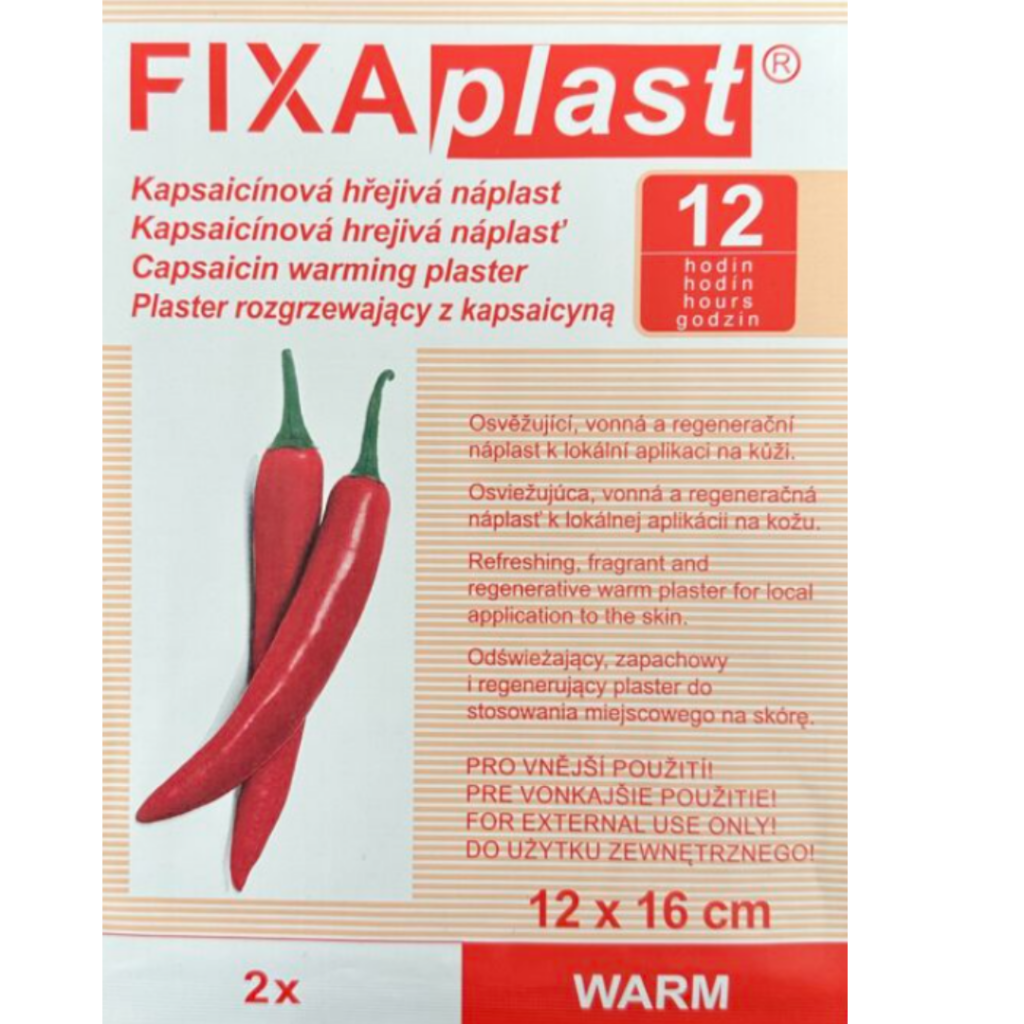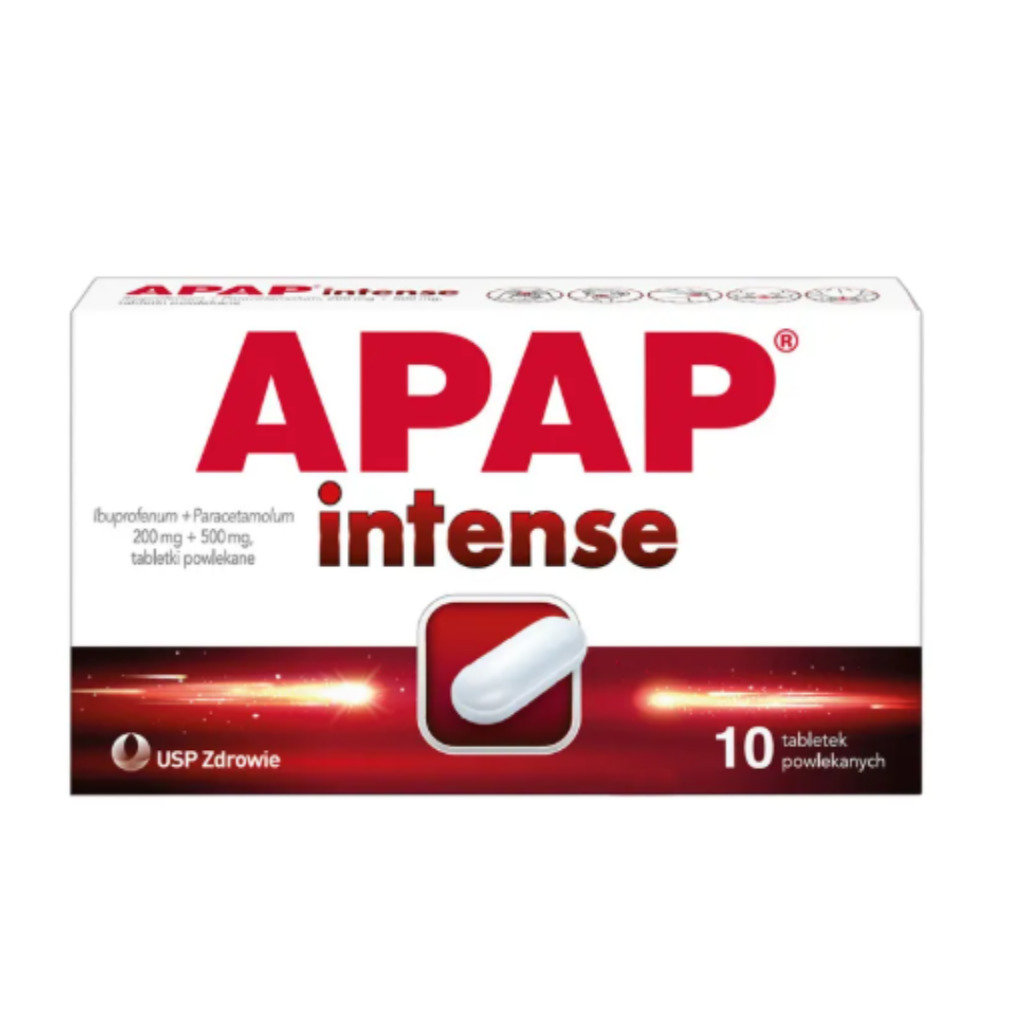Nifuroksazyd Gedeon Richter 200mg (12 Tablets)
Nifuroxazide Gedeon Richter is an antibacterial drug which has an effect on the intestinal lumen against some bacterial species.
Nifuroksazide Gedeon Richter does not destroy non-pathogenic bacteria normally found in the digestive tract. It does not cause the formation of strains of bacteria resistant to its action. After oral administration, it is practically not absorbed from the gastrointestinal tract. It is excreted unchanged in the feces.
Symptoms
Nifuroxazid Gedeon Richter is used to treat the following diseases and conditions:
- In acute and chronic diarrhea of bacterial origin.
- In other diseases with diarrhea.
Active substance: Nifuroxazide
Composition
Like all medicines, this medicine can cause side effects, although not everybody gets them.
No serious, life-threatening side effects have been observed with Nifuroxazide Gedeon Richter, except in one case of granulocytopenia (decrease in the number of a type of white blood cell called granulocytes).
In individual cases of an allergic reaction to nifuroxazide, the following side effects may occur:
- stomach pain,
- nausea,
- worsening of diarrhea.
In addition, the following side effects may occur rarely (at least 1 in 10,000 but less than 1 in 1,000 patients):
- rash,
- pimples on the skin,
- itching and bumps on the skin.
Not known (frequency cannot be estimated from the available data) the following may occur:
- allergic reactions such as skin rash, hives, angioedema, anaphylactic shock. Reporting Adverse Reactions
If you get any side effects, talk to your doctor or pharmacist. This includes any side effects not listed in this leaflet. Adverse reactions can be reported directly to the Department of Monitoring Adverse Reactions of Medicinal Products of the Office for Registration of Medicinal Products, Medical Devices and Biocidal Products
Dosage
- The usual dose for adults and children from 7 years of age is 1 capsule taken 4 times a day, every 6 hours.
- The drug Nifuroxazide Gedeon Richter is used orally. The capsules should be swallowed whole with a sufficient amount of liquid, for example a glass of water.
- If symptoms worsen or do not improve after 3 days, contact your doctor.
- Nifuroxazide Gedeon Richter should not be used for more than 3 days without consulting a doctor.
- While treating diarrhea with Nifuroxazide Gedeon Richter, it is necessary to stay hydrated, so drink plenty of fluids, preferably water, sweet or flavored drinks (average water intake for an adult – 2 liters per day), to make up for fluid loss caused by diarrhoea. In case of severe and prolonged diarrhoea, severe vomiting or reluctance to eat, intravenous rehydration should be considered.
If you have the impression that the effect of Nifuroxazide Gedeon Richter is too strong or too weak, talk to your doctor.
Contraindications
Do not take Nifuroxazide Gedeon Richter
- If you are allergic (hypersensitive) to nifuroxazide or any of the other ingredients of this medicine. An allergic reaction may cause swelling of the face, lips, tongue or shortness of breath (if you experience these symptoms, contact your doctor immediately).
- Do not use in children under 7 years of age, as children of this age may have difficulty swallowing the capsule.
Contents
The package – a cardboard box – contains 12 capsules.
Storage method
15°C-25°C
Manufacturer
GEDEON RICHTER
Warnings
This is medicine. For safety, use it according to the leaflet attached to the package. Do not exceed the maximum dose of the drug. If in doubt, consult your doctor or pharmacist.
- If diarrhea persists for more than 3 days despite taking Nifuroxazide Gedeon Richter, contact your doctor. Your doctor will perform tests to determine the cause of your symptoms and determine further treatment.
- In the event of an allergic reaction with symptoms such as rash, itching, Nifuroxazide Gedeon Richter should be discontinued.
- The drug Nifuroksazid Gedeon Richter is used together with a diet consisting in the exclusion of juices, raw vegetables and fruits, as well as spicy and hard-to-digest foods, as well as frozen foods and cold drinks from the diet. It is recommended to eat roasted meat and rice.
- During the treatment of diarrhea, continuous fluid replacement (oral or intravenous) is necessary, depending on the general condition of the patient (average water intake for an adult patient – 2 liters per day), to compensate for fluid loss caused by diarrhoea. In case of severe and prolonged diarrhoea, severe vomiting or reluctance to eat, intravenous rehydration should be considered.
Nifuroxazid Gedeon Richter with food and drink
Adequate food intake should be ensured during diarrhea, avoiding certain foods, especially juices, raw vegetables and fruits, and spicy and heavy foods, as well as frozen foods and cold drinks. It is recommended to eat roasted meat and rice. Drinking alcohol while taking Nifuroxazide Gedeon Richter may cause acute and serious intolerance reactions (so-called disulfiram-like reactions).
Nifuroxazide Gedeon Richter contains sucrose.
If you have been told by your doctor that you have an intolerance to some sugars, contact your doctor before taking this medicine.
Pregnancy and breastfeeding
If you are pregnant or breast-feeding, think you may be pregnant or are planning to have a baby, ask your doctor or pharmacist for advice before taking this medicine. Ask your doctor or pharmacist if you are taking Nifuroxazide Gedeon Richter if you are pregnant or breast-feeding.
Driving
Nifuroxazide Gedeon Richter has no influence on the ability to drive, use machines and use tools.
Overdosage
If you take more Nifuroxazide Gedeon Richter than you should, contact your doctor immediately. Show the doctor the pack of tablets.
Interactions with other drugs
The drug Nifuroxazide Gedeon Richter reduces the absorption of many drugs from the gastrointestinal tract. If you are taking other medications, consult your doctor before starting treatment with Nifuroxazide Gedeon Richter.
Side effects
Blood and lymphatic system disorders
One case of granulocytopenia has been reported,
Stomach and intestinal disorders
In individual cases of hypersensitivity to nifuroxazide, abdominal pain, nausea and worsening of diarrhea appear. No specific treatment or discontinuation of nifuroxazide is required for these mild symptoms. If the severity of symptoms is severe, the medicinal product should be discontinued. Subsequent exposure to nitrofuran derivatives should be avoided in this case.
Skin and subcutaneous tissue disorders
Rare (> 1/10,000 to < 1/1,000) skin reactions in the form of rash. One case of pustulosis in an elderly patient has been reported. One case of nodular prurigo in the course of contact allergy to nifuroxazide has been reported.




